A Taste of ‘Where You Are’ – Chef Jason Bangerter
January 22, 2020
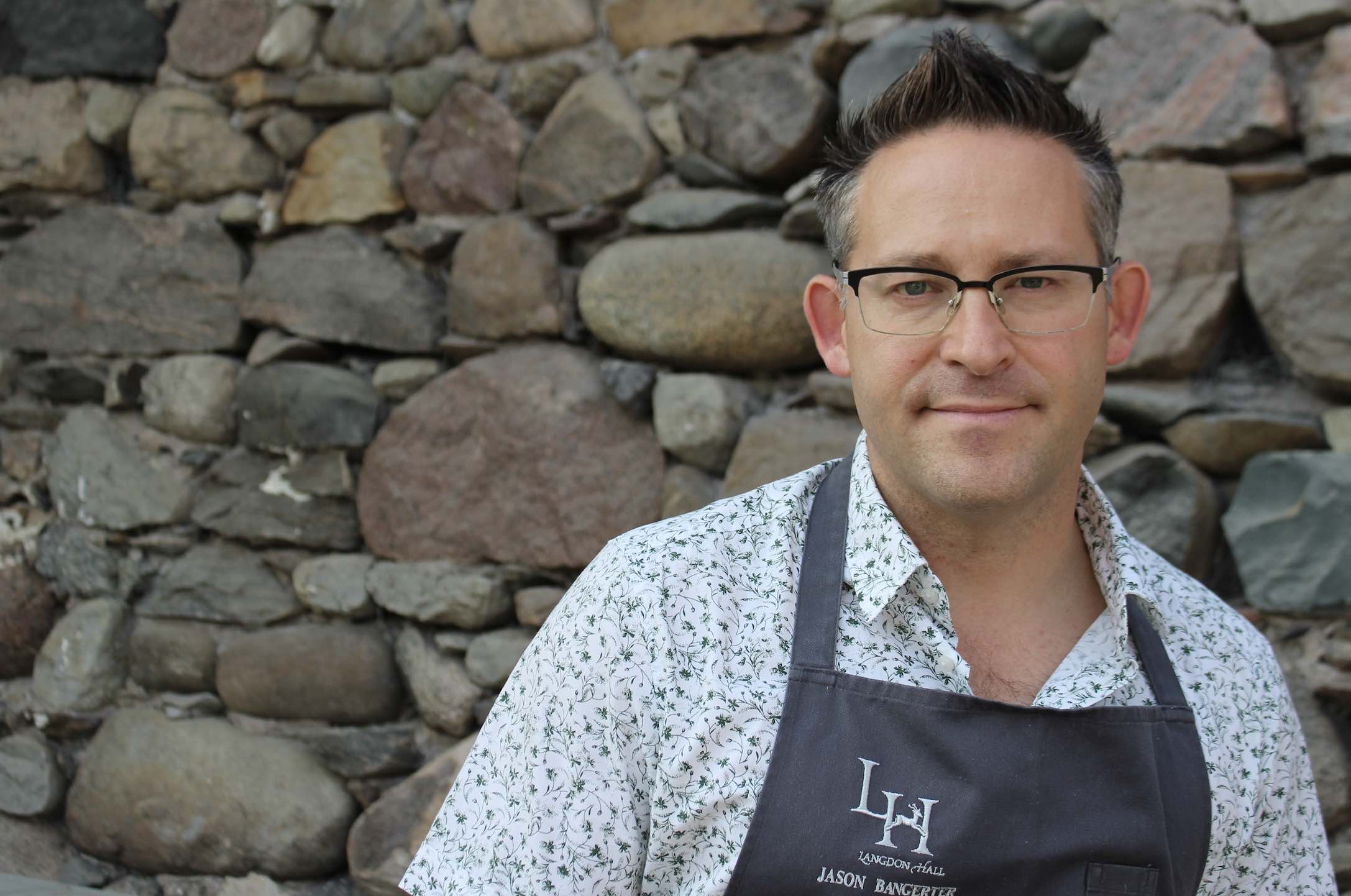
Riley Contributor Gregory George sits down with Langdon Hall’s Chef Jason Bangerter to chat about Canadian cuisine and running one of the country’s top restaurants
I recently sat down with the affable and award-winning Chef Jason Bangerter for a continuation of our last animated conversation, oh, some three years ago now. We had wandered the back fields and still-green December gardens of Langdon Hall, plucking, tasting, and smelling the bits and bites of wild edible greens and leftover carrots, beets, and Brussels sprouts that had not been scavenged and gobbled up by rabbits.
Chef Bangerter seemed almost giddy, sharing his wild boyhood backyard playpen-of-a-secret-garden with me. But now this secret garden was one of Canada’s only 5-diamond award-winning restaurants, and a Relais & Chateau listed luxury hotel, spa and conference facility.
As he humbly boasted: “There is always a good amount of marigold, geranium, mature rosemary trees, laurel, lemongrass, and figs, and even wood sorrel and chickweed that hide in the greenhouse and woods. Even the weeds in the garden are tasty.”
On that unusually warm December afternoon three year ago, we spent a leisurely hour wandering and chatting sustainability, family, and his continued love of pulling on a chef’s jacket and firing up a six burner and creating passionate food for the many guests of Langdon Hall.
In Conversation with Chef Jason Bangarter
Fast-forward to my recent visit that late, sunny September Sunday afternoon, and the sun was slowly beginning to set on what had been a hectic weekend for the culinary team at Langdon Hall. A weekend wedding for 100 in the property’s Summer House, full dinner seating on Saturday evening, 80 for Sunday brunch and a sweet and savoury full Afternoon Tea service on both Saturday and Sunday kept the culinary crew running.
I watched with curiosity and growing hunger as staff wandered Langdon Hall’s woodland trails and impressive gardens for bits and bites of freshness for the evening’s fully booked main dining room first and second seating. And yet, despite his growing celebrity and hectic schedule, Jason Bangerter continues to astound and surprise me with his unselfish generosity of time and knowledge: not just to the media, but to his entire 80+ staff, all of whom he refers to on a first name basis.
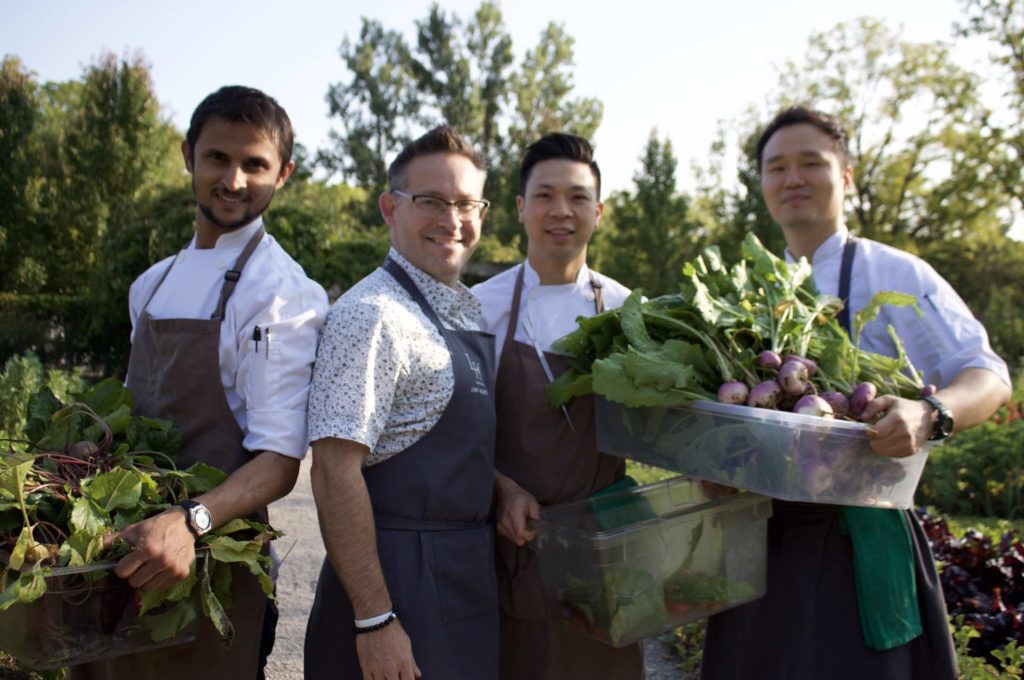
Between traveling to Paris to pick up the Relais & Châteaux Rising Chef 2015 award, winning the Ontario Hostelry Institute’s Chef Gold Award in 2017, television glory in 2018, named Iron Chef Canada Champ with the Food Network Canada and Ranked 4th Top Restaurant with Canada’s 100 Best in 2019, he still finds time to regularly visit other Relais & Châteaux properties to savour what is being created in those kitchens. And in 2019, Chef Bangerter was awarded the 2019 Canadian Slow Food Hero Award by Slow Food Canada, recognizing his efforts and vision of focusing Langdon Hall’s culinary practices and philosophy towards a more ethical and sustainable approach.
In a culinary world full of ego, swagger, and tattoos, he has not lost his genuine sense of humanness and absolute wonder at the possibilities of food.
The following is an excerpt from our hour-long conversation as we sipped a glass of 2011 Prince Edward County, Hinterland ‘Les Etoiles’, sparkling (a personal favourite, how did he know?), while catching up with this humble yet extremely classy man.
Gregory George: I’m going to jump right in here. What is Canadian cuisine?
Chef Jason Bangerter: Well, you can’t have an authentic Canadian cuisine. Canada is so big, so diverse and so different province to province. It’s not a French baguette with butter in the way French food is. When you look at Nunavut or even Fogo Island and compare it to, say, the tropics of Vancouver, and the breadbasket of Ontario, the terroir is so different, the offerings so different. Really, for me, the real sense of place and taste of Canada depends on where you are standing. So, my Canadian cuisine – how I have described it over this last year – is the taste of where you are.
For me, Canadian cuisine is what you’re eating in our restaurant; 90 percent of what comes from the ground here, from the farms surrounding us, 20 minutes from here. For example, with Langdon Hall’s current tasting menu, we’re sharing a little bit of Nova Scotia, you’re tasting a little bit of New Brunswick, you’re eating a little bit of British Columbia, because I’m bringing those elements into the menu, but on that plate, it’s all surrounded with what comes from here. So, it’s an excellent representation of Canada.
GG: Everyone talks about Canadian flavours and uniquely Canadian cuisine. That ties in directly with your ‘within 20 minutes’ statement. What I found interesting the last time we spoke was that you were out in the woods and gardens picking bites of sorrel, pine; essentially serving up whatever’s edible from your backyard. Perhaps it becomes a principal ingredient or a well-chosen bit of extra punch, garnish, or something peppery on the palate?
JB: It’s funny, my cuisine keeps evolving and changing, and I’m getting a little more ingredient ‘geeky,’ utilizing everything that comes from that one ingredient. If it’s a carrot, it’s roasted; it’s raw, it’s juiced, it’s the greens, it’s the flower that remains if you don’t pick it, and taking all those elements and putting it in one dish. You’re not just presenting a piece of carrot; you’re offering every lifecycle of that carrot, you’re telling the story of the ingredient. Then our guests ask, “What is this? I’ve never seen this white flower.” Well, it’s the flower of the wild carrot. Every item on our tasting menu offers a distinct texture, a different flavour, a unique feeling.
I don’t know if we spoke about it last time we chatted, but I was the chef at Fogo Island for a week and four days. I got there and found myself in the office with this disgusting smell… like fish. The sous chef said: “Oh, that’s our salt cod.” There were 30 salt cods all stacked up on the shelf. Of course, I asked, “What do you do with those?” “Oh, they’re gifts, and they just sit there.” My response? “Well no, pull them down.” So, we pulled them down, and they were gorgeous; beautiful. I said, “We’re going to use these tonight. “Oh,” he said, “you can’t cook them, you’ve got to rehydrate them.” “No,” I said, “we’re going to use them as plates.”
When the local fishermen brought in their catch, I got the livers, and I got the cheeks, and I got the filets, all the awesome stuff from these beautiful fish. We made this beautiful batter and fried the cod cheeks and tongues and served them on the salt cod skin. The Newfies went crazy…”Oh boy – oh, geez, these boys have cod on cod.” [Laughs] They’d never seen it before! I also made a beautiful liver paté. I used my recipe, removed the Madeira and Brandy and replaced it with a lovely dry white wine with the fresh cod liver. They thought I’d changed the world. It was the most delicious, the most beautiful thing. And that’s what I do now. I look at everything in its entirety. If I serve caviar, I make sure a big sturgeon’s skin goes to the table. If I’ve got BC tuna, I’m serving the tuna on the actual spine of the tuna… and it tells a story of where it came from, and it reinforces all the ingredients as the focal point.
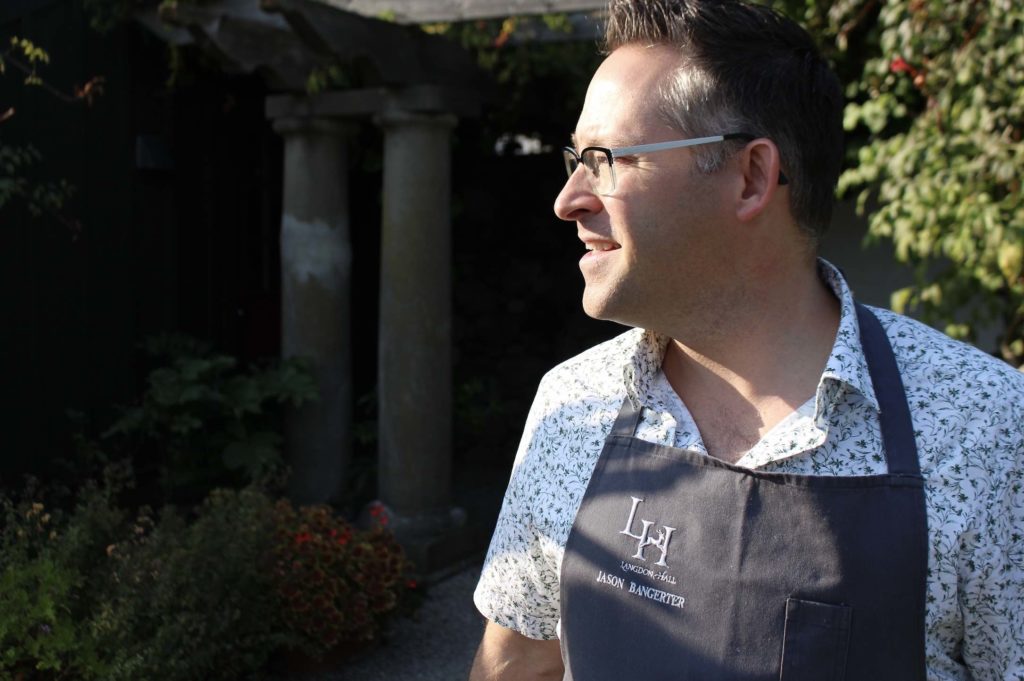
GG: You seem to be tipping your hat to the Lyonnaise style of food. The casual, convivial feel of its famous original Bouchon’s. You’ve heard of those traditional 18th century inns, where arriving carriages with tired travelers were served reviving plates of tête de veau, or pistachio-studded sausages on red lentils by Lyon’s mères, those healthy, supremely thrifty women who defined its cuisine by using every bit of the cow or ingredient they had at hand.
JB: Yes. You are going back to the old ways. You’re going back to slow food. Somebody asked me the other night: “What do you think of the farm-to-table movement? Where is it going? What does it represent for you? Is it a trend?” I laughed, and said, “You know, what is ‘farm-to-table’?”
There’s no such thing as a farm-to-table trend. You go to France, to Brittany, you go to the countryside in Lyon, you go to Italy, and you say to somebody, “Oh, I’m a farm-to-table chef,” they’re going to look at you like you’ve got two heads. Of course, you’re a farm-to-table chef. We are all farm-to-table chefs. You know, to make a trend of it or to create some style of cuisine, that’s what it’s all about. Farm-to-table cooking is not a trend. It’s utilizing what is here, what is best, right now.
For me, the bigger picture is this: nothing is better than something that’s been plucked from the ground an hour ago. So, to use ingredients from a local farm or our garden or forest or the creek down the road or the apple tree in our orchard, there is nothing I can get from a truck that is going to be fresher. And, for me, the freshness, the purity of the ingredient, in its absolute best state, is what I want to be serving to my guests. And when it comes down to slow food or farm-to-table movements, if I can get it from someone locally, I will be giving back to my community. If it’s the farmer that is doing heritage or organic, and they’re struggling to produce something that is absolutely the best they can provide, I would instead buy their products here in my community and build relationships with my farmers and artisans in this area than work with something that came from California or China.
So, the big picture for me is to teach my cooks about the value of growing their produce, of understanding the whole process of it. I’ve got to the point now where my cooks are scheduled in the spring to go out and do gardening with Mario, Langdon Hall’s Head Gardener. Instead of hiring people to come in to till and plant the seed and tend our gardens, my cooks do it. It’s a slower time and instead of laying them off, or giving them three days a week instead of five, they do two weeks with Mario. So, when everything starts to come up, they understand the full cycle, and have an appreciation, and respect for what’s happening in the garden.
GG: Obviously, your staff brings a better understanding to the product.
JB: Absolutely. And more passion, more education. You know, where else are you going to learn that, as a cook, in Ontario? And then, even more significant than that, going down, visiting the farms that are in the area, talking to the farmers about what I want, and what I like and love.
You know, I have whole pigs. There aren’t many hotels that still use whole animals. I’ll have a 500-pound pig come in the back door, high-five the farmer, he’ll throw me a basket of tomatoes. Number one, it’s the best pork I’ve ever tasted in all my cooking, all over the world. And, my guys learn how to do charcuterie, butchery, everything.
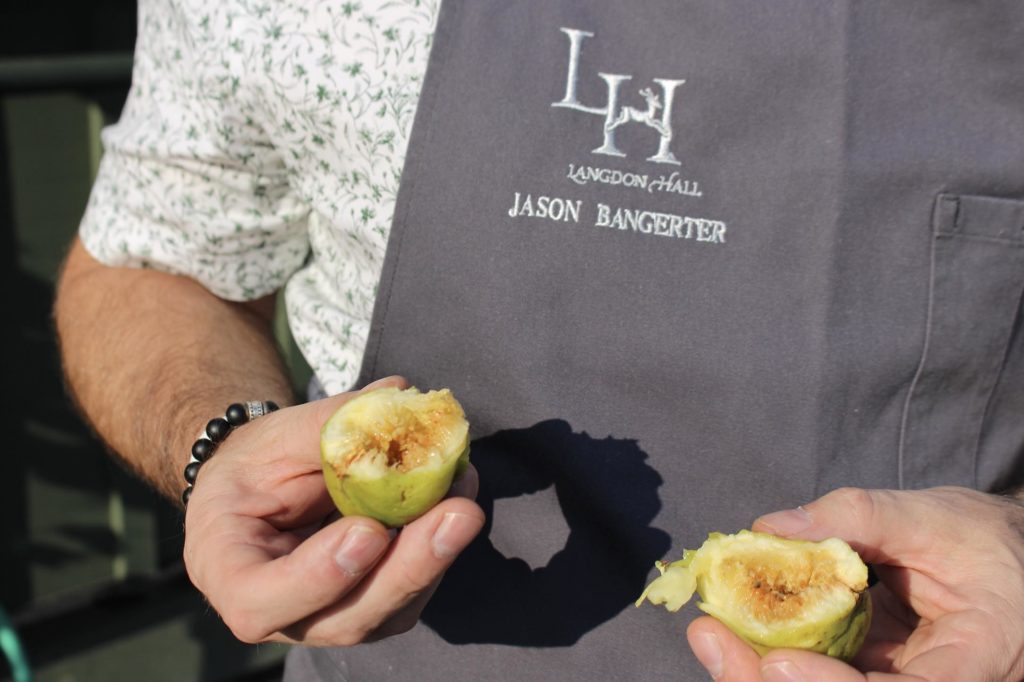
GG: Do you have any say in how that pig is raised?
JB: I do, if I want to. That guy is already producing his best. I don’t need to even look at it. He feeds them tomatoes and eggs. And because he also provides Langdon Hall with all our eggs, at breakfast, we crack these beautiful, heritage, free-run eggs: none of them are white, they’re blue-green and brown, speckled, and all different sizes. The best eggs you’ve ever tasted. When the farmer comes to me with his product, and it’s absolutely the best I’ve ever tasted, I don’t need to change a thing.
I sincerely believe that we have a responsibility to the guest. We’re only here for them, right? I’m not here cooking whatever I want to cook. I’m creating with the guest in mind, the person who’s sitting in that chair and spending that money. I’m here, and everyone else is here, for that person. I’m not going to dictate to a guest, “Oh no, I’m not making you McDonald’s french fries, because I don’t do that,” or, “I’m not giving you salt at the table because I already seasoned it perfectly.” I’m not one of those guys.
If that person wants a bucket of salt, I will get them the best salt there is, in a sterling silver bucket and I will have it sent to them on a pillow. That’s what they’re here for. But, at the same time, I’m going to give them salt that’s Canadian, it’s going to be manufactured and harvested in a way that is responsible and ethical. That also is the responsibility of a chef. Sustainable seafood. Locality. Organic. You know, people say, “Organic is so expensive.” Do you know how much more the farmer must pay for that to be organic? That farmer has to invest and change his or her lifestyle to create something that is that pure. It costs money. That’s why the product costs more. It’s not a gimmick. It’s not a scam. And, if I’m buying that to support that farmer – that’s a Canadian farmer. And if we don’t help those farmers, if Canadians don’t get behind our farmers, we won’t have any farming families left. We’ve got to pay a little bit more to support our farmers, or we’re going to end up all eating food from overseas.
GG: So, this bookends what we just talked about. “How do you think chefs should use their notoriety to combat the inequalities in the food and restaurant industry?” It’s not just about food, but about the industry as a whole.
JB: I think that chefs are influential and powerful. I think chefs have a big responsibility, and I don’t think a lot of them, especially the younger ones, realize that. It’s not just about cooking beautiful food and getting through service. We have a responsibility to our brigade and our diners to educate, and to grow, to create. Listen, I think nowadays you need to forge a culture where there is respect, and there is equality. And a good life.
GG: I think people come here to dine, not necessarily to stay. They expect that they’re not going to get hotel food.
JB: Night and day. And that’s what I offer. But listen, it’s different here too. I mean, where we are, you’re getting a different service. You can’t compare this to a lot of other things that are happening in Canada, and the price is relevant and dictates that too. But, I’m at the point now where my food – and my inspiration – is coming from this property and my cooks and the people that are here and the farmers. This past spring, I visited Meadowood… the French Laundry. I addressed North American chef delegates on sustainability and farm-to-table and the importance of locality. I dined at some of the best – Quince in San Francisco – and these places, these three-star Michelin, world-top places… we’re on par.
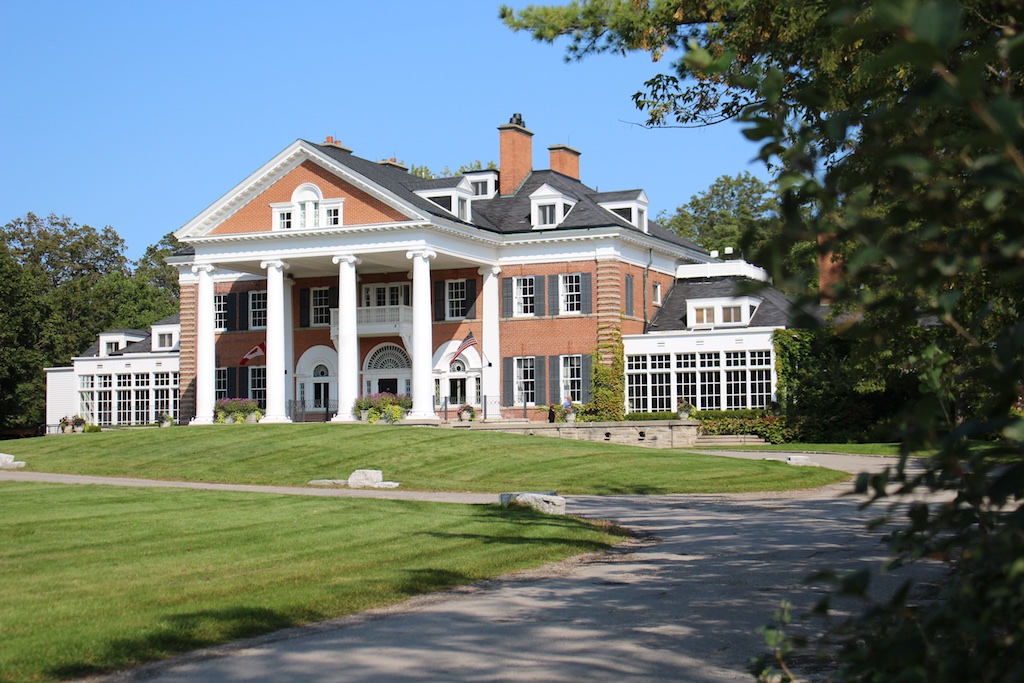
GG: Well, people choose to be here. It’s not like they’re driving two and a half hours and they don’t have a reservation.
JB: We may be a little more expensive than a lot of places. We don’t get complaints about that. We are often told we’re cheaper than a lot of other properties that are at this standard, internationally. Something you’re not going to get it in Toronto. In fact, I don’t even know what’s going on in Toronto anymore.
GG: Do you miss the City?
JB: No, I loved everything that I’ve done in my career. I wouldn’t change a thing. I loved my time in Toronto. I loved my time at TIFF. I loved my time with Michael Bonacini and Peter Oliver. Auberge de Pommier, the King Edward Hotel, everything. I wouldn’t change a thing. Everything I’ve done, everything you do gets you to where you are. I’m in the best place I’ve ever been right now, and it’s because of everything I’ve done and because of all the support I have. I don’t want people that come to Langdon Hall from the city to get the same thing they can get anywhere in Toronto. You know, why would you drive an hour or two to come out here, to eat the exact same thing you could eat anywhere in Toronto?
I go back maybe a dozen times a year now, to do events. You know, I did an event with Daniel Boulud, at Café Boulud in Yorkville. That’s what I do, I travel and I do events, I do charities. Auberge du Pommier was 30 years this year. They had a “Welcome Back, Jason Bangerter” event; a sold-out event. It was incredible working with John Horne and the team at Auberge. It was just so lovely. They could have booked that five nights in a row. They turned so many people away. It was very touching.
GG: What’s next?
JB: I had my chocolate supplier say, “Listen, you use one ton of chocolate a year. You might as well do something unique.” And I said, “Well, it’s not a local ingredient, and it’s not my area of focus.” She said, “But you use it, and you can do something that’s your own.” So, I took 17 single-origin dark chocolates from around the world… and now I have my brand of chocolate, based on the flavour profile that I want, and inspired by this property: smoky, earthy, vegetal.
And that’s the only dark chocolate we use. I researched this in Paris, in their private lab at Or Noir. I spent 12 hours in the lab, mixing four dark chocolates from around the world and creating my unique blend, doing all the packaging. Now, when we order chocolate for desserts and stuff, that’s all we use: mine. I went to the Dominican, to a plantation, and did the whole process, from jungle to bar. It was pretty cool.
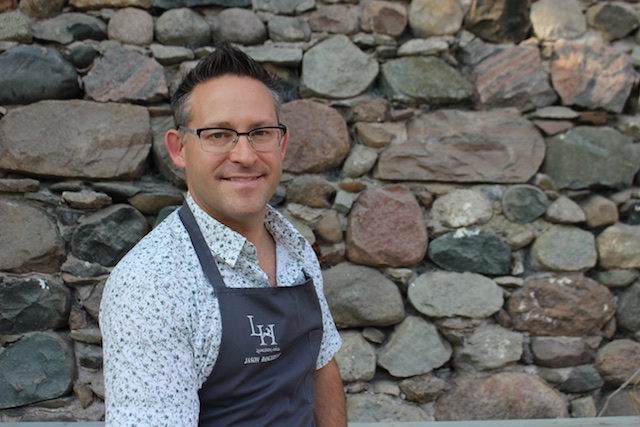
GG: What was the first dish where you said, “This is my passion, this is what I’m going to do, this is what is going to take me through the next 30 years of my life?”
JB: Well, the first fine cuisine I ever tasted was at my aunt’s house, when I was five. My Aunt Jan is a gourmand. You know, the escargots and the pâtés: that was my aunt. She still is a great and amazing chef and cook, and she loves to create fantastic cuisine.
You know, I think it was when I went to the King Edward Hotel. It was meeting John Higgins. And, it was kind of like that moment in Ratatouille the movie, when Ratatouille goes into the kitchen for the first time, and there are copper pots clanging, and yelling, and fire and flames. Just being there and being a part of that was an inspiration for me. The restaurant was Chiaro’s at the time, right? It was the number one restaurant in Toronto then.
But it wasn’t until I won Employee-of-the-Year with Meridian and was sent to Paris, that I walked into a room where there was all this beautiful French food. Eighty different French farm kinds of cheese, and I ate every single one. And that’s where I got the bug for Europe. And that’s when I wanted to focus on being something, you know, really great.
I’ve won so many awards this past year. I just was honoured with the Chef-of-the-Year Pinnacle Award, the OHI Chef Award, and the Farm-to-Table Award from Canada’s 100 Best. We were ranked #15 in Canada by that publication this year, as well.
Did you see the article that came out in the National Post, by Howard Levitt? The one that said we’re the only three-star Michelin restaurant in Canada?
All this stuff is just – I can’t even dream this stuff up. It’s amazing. [Laughs]
GG: Do you care about the ratings?
JB: You know what? I don’t care. But, if someone is rated higher than me, and I go there, and it’s not even close, I have a problem with that.
GG: But, I mean the Michelin ratings, because we don’t have one?
JB: If we had Michelin, I would definitely be interested in being a part of it.
__________
Contributor Gregory George is a world traveler, writer and co-founder / Editor-in-Chief of the www.followsummer.com travel site. You can follow Gregory’s travel inspirations on Instagram, Facebook, and Twitter.


Six Sri Lankan Retreats Focus on Sustainability and Community
Riley’s Beth Hoke recently explored six unique Sri Lankan resorts making headway with their innovative sustainability programs

Float On: The Revolutionary Elysium Chair
Contributor Hannah Laws takes a seat in the world’s most expensive luxury office chair: the revolutionary Elysium chair

The Top Westlake Village Hotels and Resorts
Whether you’re staying for a night or a week check out Contributor Mary Noe’s list of the very best Westlake Village Hotels and Resorts

Bürgenstock Resort — Luxury in Lucerne
Bryan Dearsley visits the luxurious Bürgenstock Resort in Lucerne Switzerland, and doesn’t want to leave. Ever.

Blue Spa Munich: An Oasis of Calm
Riley Contributor Beth Hoke pays a visit to the Blue Spa in Munich and finds an oasis of calm in this bustling German city… and on a clear day, she could see the Alps



